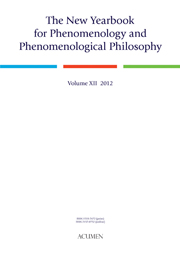Book contents
- Frontmatter
- Contents
- Articles
- Three Levels of Historical Analysis in Early Heidegger
- Heidegger's Schematism of Life and its Kantian Inheritance: A Critical Appraisal
- Husserl's Mereological Semiotics: Indications, Expressions, Surrogates
- Process and Relation: Husserl's Theory of Individuation Revisited
- Mathesis Universalis and the Life-World: Finitude and Responsibility
- Multiplicity, Manifolds and Varieties of Constitution: A Manifesto
- Phenomenology in the United States
- Documents
- In Review
Multiplicity, Manifolds and Varieties of Constitution: A Manifesto
from Articles
- Frontmatter
- Contents
- Articles
- Three Levels of Historical Analysis in Early Heidegger
- Heidegger's Schematism of Life and its Kantian Inheritance: A Critical Appraisal
- Husserl's Mereological Semiotics: Indications, Expressions, Surrogates
- Process and Relation: Husserl's Theory of Individuation Revisited
- Mathesis Universalis and the Life-World: Finitude and Responsibility
- Multiplicity, Manifolds and Varieties of Constitution: A Manifesto
- Phenomenology in the United States
- Documents
- In Review
Summary
Abstract: This paper is the attempt to provide a novel and original reconstruction of Husserl's phenomenology, its meaning and scope, on the basis of the two “operative” concepts of Mannigfaltigkeit and Konstitution. It critically engages some current mainstream interpretations of phenomenology and suggests a different take on the idea of transcendental phenomenology.
Keywords: Operative concepts, multitude, one and many, manifold, constitution, Edmund Husserl
Those are my principles, and if you don't like them … well, I have others.
(Groucho Marx)In what follows I would like to consider the somewhat awkward idea of a manifesto as it relates to Husserl's phenomenology. I will try not to discuss this or that point of Husserl's phenomenology or submit an alternative reading of this or that text, but rather take the risk of addressing some questions about the peculiarity of phenomenology as such. More precisely, I would like to suggest a different way of responding to that question that we have all heard so many times—sometimes friendly, sometimes quite aggressively—from students, friends, colleagues and critics. The question, dreadful and not-so-inevitable, is the following: “What is phenomenology actually all about?”
One objection may arise quite immediately, namely “What is actually the point of asking such a question?” Especially in a time when our departments are filled with “phenomenologists,” “post-phenomenologists,” or “anti-phenomenologists.” One could also object that, more or less, we all know something about phenomenology.
- Type
- Chapter
- Information
- Publisher: Acumen PublishingPrint publication year: 2013

